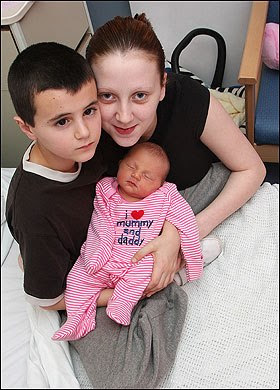Can you imagine becoming a parent at the tender age of 12? This reality is not just a figment of imagination but an actual occurrence in history. The world has witnessed several instances where young individuals have become parents, challenging societal norms and raising questions about responsibility and preparedness. Among these stories, Sean Stewart stands out as one of the youngest fathers ever recorded. His story, along with others like Lina Medina's, brings to light the complexities and challenges faced by such young parents.
The phenomenon of young parenthood is not new. Historical records document numerous cases where teenagers and even pre-teens have become parents. One such case involves Lina Medina from Peru, who holds the record for being the youngest confirmed mother in history. She gave birth to her son Gerardo on May 14, 1939, when she was merely five years old. Her story remains unparalleled, highlighting the extreme circumstances that can lead to early parenthood. While Lina’s case is unique due to its medical rarity, other instances reflect more common scenarios where teenage pregnancy leads to parenthood.
| Name | Lina Medina |
|---|---|
| Date of Birth | September 27, 1933 |
| Place of Birth | Pisco Province, Peru |
| Known For | Youngest Confirmed Mother in History |
| Child's Name | Gerardo Medina |
| Reference Website | Wikipedia - Lina Medina |
In contrast to Lina Medina’s situation, Sean Stewart became a father at the age of 12 in 1998. His case garnered significant media attention due to his young age and the circumstances surrounding his relationship with his then-16-year-old girlfriend, Emma Webster. Despite the controversy, Sean’s journey into fatherhood highlights the broader issue of teenage pregnancies and the responsibilities thrust upon young shoulders. Such situations often result from a lack of education, awareness, or support systems that could guide these individuals through their formative years.
The implications of becoming a parent at such a young age extend beyond personal experiences. They affect educational pursuits, career opportunities, and social relationships. For instance, many young parents find it challenging to continue their education while managing the demands of childcare. This dual responsibility often forces them to make difficult choices, sometimes leading to long-term consequences. Moreover, societal judgments and stigmas attached to early parenthood can further complicate their lives, affecting mental health and self-esteem.
While individual stories like those of Lina Medina and Sean Stewart are compelling, they also underscore systemic issues within societies. Access to comprehensive sex education, contraception, and reproductive health services plays a crucial role in preventing unintended pregnancies among adolescents. Additionally, creating supportive environments where young people feel comfortable discussing their concerns without fear of judgment is essential. By fostering open dialogues and providing necessary resources, communities can help mitigate some of the challenges associated with early parenthood.
Furthermore, understanding the psychological aspects of early parenthood is vital. Young parents often face emotional turmoil as they navigate the transition from childhood to adulthood prematurely. This abrupt shift requires maturity levels that may not align with their chronological ages. Consequently, offering counseling services and mentorship programs tailored specifically for young parents becomes imperative. These interventions aim to equip them with coping mechanisms and life skills necessary to handle their new roles effectively.
Another aspect worth considering is the legal framework governing parental rights and responsibilities for minors. Laws vary across countries regarding consent, custody arrangements, and financial obligations. Ensuring fair treatment under the law while safeguarding the best interests of both parent and child necessitates careful consideration of each case individually. Legal professionals specializing in family law must stay informed about evolving standards to provide appropriate guidance to young parents navigating complex legal landscapes.
Media portrayals of young parenthood also influence public perception significantly. Sensationalized headlines focusing solely on the novelty aspect tend to overshadow deeper discussions around root causes and potential solutions. Responsible journalism should strive to present balanced narratives that highlight both challenges faced by young parents and available support networks. Highlighting success stories where young parents overcome adversity serves as inspiration for others facing similar circumstances.
Education remains key in addressing issues related to early parenthood. Implementing evidence-based curricula emphasizing healthy relationships, consent, and reproductive rights equips students with knowledge needed to make informed decisions about their bodies and futures. Schools partnering with community organizations can enhance outreach efforts ensuring all youth regardless of socioeconomic background receive equal access to information and resources.
Beyond traditional educational settings, digital platforms offer innovative ways to reach wider audiences. Online campaigns utilizing social media channels engage younger demographics through relatable content delivered via formats popular among teens today. Interactive tools like quizzes, videos, and live Q&A sessions create engaging learning experiences promoting positive behaviors among users.
Ultimately, tackling the issue of young parenthood requires collaborative efforts involving multiple stakeholders including governments, educators, healthcare providers, non-profits, and families themselves. Each entity contributes uniquely towards building resilient ecosystems capable of supporting young parents throughout their journeys. Through sustained commitment and coordinated action plans, society can foster environments conducive to healthy development for all involved parties – enabling young parents to thrive alongside their children.
As we reflect on historical precedents set by figures like Lina Medina and contemporary examples represented by Sean Stewart, it becomes evident that progress hinges upon collective willpower and strategic planning. Addressing gaps in existing systems while embracing innovation ensures sustainable improvements benefiting generations to come. Recognizing the inherent value each young parent brings to our shared human experience motivates us collectively to act responsibly ensuring equitable opportunities exist universally.



